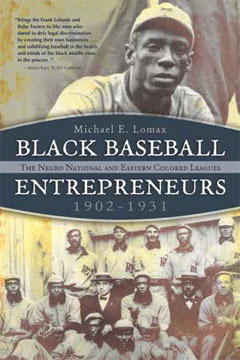Posted: Dec. 16, 2014
 As the companion volume to Black Baseball Entrepreneurs,1860–1901: Operating by Any Means Necessary, Lomax’s new book continues to chronicle the history of black baseball in the United States. The first volume traced the development of baseball from an exercise in community building among African Americans in the pre–Civil War era into a commercialized amusement and a rare and lucrative opportunity for entrepreneurship within the black community. In this book, Lomax takes a closer look at the marketing and promotion of the Negro Leagues by black baseball magnates. He explores how race influenced black baseball’s institutional development and how it shaped the business relationship with white clubs and managers. Lomax explains how the decisions that black baseball magnates made to insulate themselves from outside influences may have distorted their perceptions and ultimately led to the Negro Leagues’ demise. The collapse of the Negro Leagues by 1931 was, Lomax argues, "a dream deferred in the overall African American pursuit for freedom and self-determination."
As the companion volume to Black Baseball Entrepreneurs,1860–1901: Operating by Any Means Necessary, Lomax’s new book continues to chronicle the history of black baseball in the United States. The first volume traced the development of baseball from an exercise in community building among African Americans in the pre–Civil War era into a commercialized amusement and a rare and lucrative opportunity for entrepreneurship within the black community. In this book, Lomax takes a closer look at the marketing and promotion of the Negro Leagues by black baseball magnates. He explores how race influenced black baseball’s institutional development and how it shaped the business relationship with white clubs and managers. Lomax explains how the decisions that black baseball magnates made to insulate themselves from outside influences may have distorted their perceptions and ultimately led to the Negro Leagues’ demise. The collapse of the Negro Leagues by 1931 was, Lomax argues, "a dream deferred in the overall African American pursuit for freedom and self-determination."HUBBY'S REVIEW:
| This is vol 2 in this authors study or look at Black Baseball Entrepreneurs, from 1902 to 1932 which really was a big growth period for us as a Nation until the depression and everything then went down. The author not only discuss the players but also the games and looks into some of the owners as well. Mr. Lomax, does a lot of research in the teams and the leagues from that period, for example, NNL (National Negro League), ECL (Eastern Colored League), ANL, (American Negro League) and he researches through many black newspapers from that time period. He goes into how some former players were owners and also how a few white owners in order to make ends meet would let them play games at their ball park while their club was on the road. He also goes into great detail about Rube Foster, a former player who became an owner, also C.I. Taylor, Ed Bolden, John Connor, Henry Tucker, Thomas Jackson, to name a few. These men would lead the game and he also discussed how they worked with some white owners and a white man named Strong, who at the time was important for both races in booking games and finding places for them to play at. He also suggested that Strong had ties to the Tammany Hall, party in New York, and if that is true or was true for the early part of the 1900s they ran just about everything, so I can believe that you would have to work with them somehow until they were finished. He also discusses a thought between to different types of business ideas in the Black community that started in the 20s. They were the Booker T. Washington, were you needed to work with the white business man in some form, and the Tuskegee, way that believed that the Black community can be self-sufficient and not rely solei on the white man for survival. This last idea was the ground for the new Black Baseball Leagues in the 30s, with men who were self-sufficient like Cumberland Hayes, who owned the Grays and that team was solid until Robinson went to the Dodgers. This was a good book with a lot of information, but at times I felt that it jumped from year to year. That would be my only complaint. I got this book from net galley. |




No comments:
Post a Comment
We ask that when you are leaving a comment that you are remebering that children may be reading this blog, without the knowledge of a consenting adult. We all put our disclaimers on to get into the sites but kids are smart. Please be aware when posting to use safe language and pics. Thanks :)